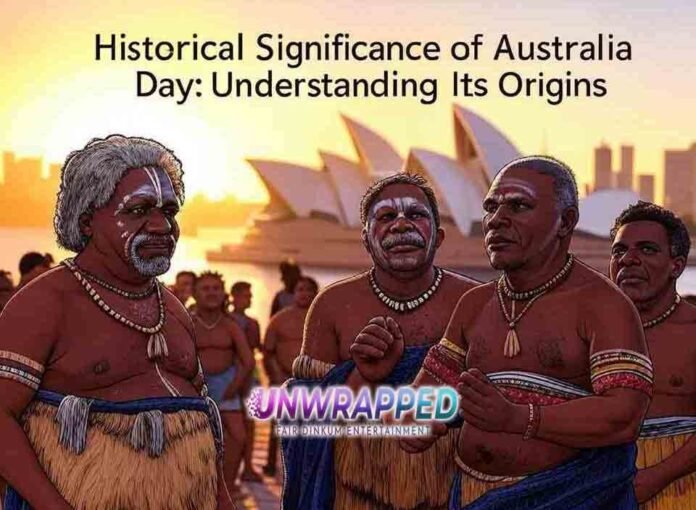Australia Day, observed annually on January 26th, is a day of reflection, celebration, and sometimes, debate. While many Australians view it as a time to come together and celebrate the nation’s achievements, its origins hold deep historical significance. To fully appreciate the day, it’s essential to understand its roots, its evolution over time, and its impact on Indigenous communities and national identity.
In this article, we’ll explore the history of Australia Day, its significance, and its evolving narrative in contemporary Australia.
The Origins of Australia Day
1. The Arrival of the First Fleet
- Australia Day marks the anniversary of the First Fleet’s arrival at Port Jackson (modern-day Sydney) in 1788.
- On January 26th, Captain Arthur Phillip raised the British flag, officially establishing a penal colony in New South Wales.
- This event symbolized the beginning of British colonization in Australia, profoundly impacting the land’s First Nations peoples.
2. Indigenous History Before 1788
- For tens of thousands of years prior to colonization, Australia was home to diverse Aboriginal and Torres Strait Islander communities.
- These communities had rich cultures, languages, and traditions, deeply connected to the land and environment.
- Colonization disrupted these societies, leading to dispossession, displacement, and significant cultural loss.
Learn more about Indigenous Australia through resources like AIATSIS.
The Evolution of Australia Day
1. Early Commemorations
- The first recorded celebration of January 26th occurred in 1808 when freed convicts in New South Wales marked the colony’s founding.
- By the mid-19th century, the day became known as “Foundation Day,” with formal celebrations centered around Sydney.
2. Becoming a National Celebration
- In 1935, all Australian states and territories adopted January 26th as “Australia Day.”
- However, it wasn’t until 1994 that Australia Day became a public holiday across the country.
3. Contemporary Celebrations
- Today, Australia Day is marked by various activities, including citizenship ceremonies, fireworks, community events, and reflections on national history.
- For many, it’s a day of pride, celebrating Australia’s multiculturalism, achievements, and resilience.
The Controversy Surrounding Australia Day
1. “Invasion Day”
- For many Aboriginal and Torres Strait Islander peoples, January 26th is a day of mourning, symbolizing the beginning of colonization and its devastating impacts.
- The term “Invasion Day” is used to highlight the dispossession and suffering faced by Indigenous communities.
2. Calls for Change
- There are growing movements advocating for a change in the date of Australia Day to create a more inclusive celebration.
- Proposals include choosing a date that reflects unity and reconciliation, such as January 1st (marking Federation) or May 27th (the anniversary of the 1967 Referendum).
3. Recognizing Indigenous Perspectives
- Events like the Yabun Festival in Sydney provide a platform for First Nations voices, celebrating culture while acknowledging the day’s historical significance.
- Learn more about the Yabun Festival at Yabun.org.au.
Key Moments in Australia Day’s History
1. Federation (1901)
- On January 1, 1901, the six colonies united to form the Commonwealth of Australia.
- While not tied to January 26th, Federation marked a significant step toward Australia’s national identity.
2. The Bicentenary (1988)
- The 1988 Bicentennial celebrations included large-scale parades and events, but they also sparked widespread protests by Indigenous Australians.
- These protests, known as the “March for Justice, Freedom, and Hope,” highlighted the ongoing struggles for recognition and equality.
3. National Sorry Day (1998)
- Established on May 26th, National Sorry Day acknowledges the Stolen Generations and promotes healing and reconciliation.
Celebrating Australia Day in a Modern Context
1. Reflect, Respect, Celebrate
- The National Australia Day Council promotes this motto to encourage a balanced approach to the day.
- Reflection involves acknowledging the complex history and its impact on Indigenous peoples.
- Respect focuses on celebrating the nation’s diversity and achievements.
2. Indigenous Cultural Events
- Many cities host events that celebrate Aboriginal and Torres Strait Islander culture, such as art exhibitions, performances, and storytelling sessions.
3. Citizenship Ceremonies
- Over 16,000 people typically become Australian citizens on January 26th each year, highlighting the country’s multicultural identity.
How to Observe Australia Day Thoughtfully
1. Educate Yourself
- Learn about Australia’s history, including its Indigenous cultures and the impacts of colonization.
- Recommended resources:
2. Attend Inclusive Events
- Participate in events that honor both celebration and reflection, such as the Yabun Festival or local Reconciliation Walks.
3. Support Indigenous Businesses
- Celebrate the day by supporting Aboriginal-owned businesses or purchasing art, jewelry, and crafts that highlight First Nations cultures.
The Future of Australia Day
As discussions about the significance and inclusivity of Australia Day continue, the nation is at a crossroads. Striking a balance between celebration and acknowledgment requires open dialogue, education, and empathy. Many Australians are reimagining the day as an opportunity for unity, respect, and shared understanding.
Call-to-Action
Australia Day holds deep historical significance that invites both celebration and reflection. By learning about its origins, acknowledging diverse perspectives, and engaging in meaningful activities, we can honor the day in a way that fosters unity and respect. Share this guide to encourage thoughtful conversations and inspire others to explore Australia’s history.
External Resources
- AIATSIS: Indigenous Australian Resources
- National Museum of Australia: Exhibits and Resources
- Reconciliation Australia: Learn More
- Yabun Festival: Event Details
Memorable Conclusion
Australia Day’s history is complex and multifaceted, offering both moments of pride and opportunities for reflection. Understanding its origins and evolving meaning is key to fostering a more inclusive celebration. Whether you choose to attend a cultural event, support Indigenous communities, or simply reflect on the nation’s journey, let this Australia Day be a meaningful and respectful observance of Australia’s past, present, and future.
See Also: Comprehensive Guide to Australia Day: Celebrations Across All States











